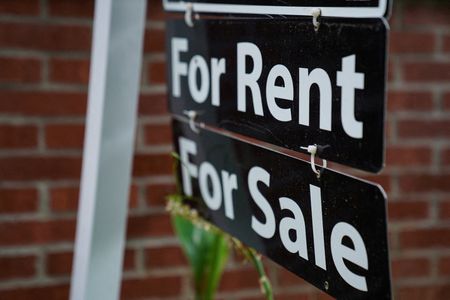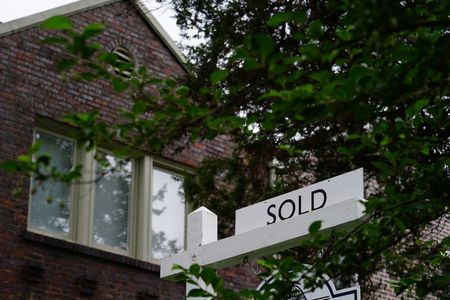(This Aug. 22 story has been corrected to fix the name of Moody’s Analytics at the bottom of paragraph 3)
By Safiyah Riddle
(Reuters) – U.S. existing home sales dropped to a six month-low in July as home owners who are locked into cheap mortgages refrained from selling their properties with the cost of new mortgages for another home at the highest levels in decades.
That limited inventory, however, helped drive prices higher on a year-over-year basis for the first time since January.
Existing home sales fell 2.2% in July to a seasonally adjusted annual rate of 4.07 million units, the lowest level since January, from an unrevised 4.16 million units in June, the National Association of Realtors said on Tuesday. Economists polled by Reuters had forecast home sales would be little changed at 4.15 million units.
Sales fell in the Northeast, Midwest and South, but rose in the West, where home prices have fallen most sharply in the past year. All regions experienced annual sales declines.
Home resales, which account for a big chunk of U.S. housing sales, fell 16.6% on a year-on-year basis in July.
Home prices have bottomed out after being pressured by the Federal Reserve’s aggressive interest rate hikes, but the persistent shortage of properties for sale could limit any rebound as many prospective buyers are forced out of the market.
Mortgage rates have surged again recently to the highest levels in decades, with the average rate on the popular 30-year fixed-rate mortgage topping 7% in the latest week, according to mortgage finance giant Freddie Mac.
There were 1.11 million previously owned homes on the market last month, up 3.7% from a month earlier but down 14.6% from July 2022. At July’s sales pace, it would take 3.3 months to exhaust the current inventory of existing homes, up from 3.2 months a year ago.
A four-to-seven-month supply is viewed as a healthy balance between supply and demand. The median existing house price rose 1.9% from a year earlier to $406,700 in July, the fourth time it has topped $400,000.
“Two factors are driving current sales activity – inventory availability and mortgage rates,” said Lawrence Yun, the NAR’s chief economist. “Unfortunately, both have been unfavorable to buyers.”
‘LOCK-IN EFFECT’
The dearth of existing houses on the market has helped bolster new home construction and sales in recent months. The NAR predicted that total resales in 2023 will fall 12.9% from 2022, at the same time that total new home sales in 2023 will increase by 12.3%.
The Commerce Department will report new home sales data for July on Wednesday. Economists polled by Reuters see a modest uptick in transactions. New home sales have outperformed existing home sales so far this year.
Properties typically remained on the market for 20 days in July, up from 14 days a year ago. Seventy-four percent of homes sold in July were on the market for less than a month. First-time buyers accounted for 30% of sales, up from 29% a year ago.
Sales fell the least for homes priced at more than $1 million as supply was less constrained relative to demand than for lower-value homes, Yun said.
All-cash sales accounted for 26% of transactions compared to 24% a year ago. Distressed sales, including foreclosures, represented 1% of transactions, essentially unchanged from June and the previous year.
Yun said it was “anyone’s guess” as to when mortgage rates might begin easing, and some economists don’t expect much relief until 2024.
“Forecasting mortgage rates in the near term is very difficult, but it’s our expectation that mortgage rates will begin to normalize next year,” said Matthew Walsh, an economist at Moody’s Analytics who focuses on the housing market.
That could encourage some home owners to resell and look for more new housing, he said, but it could be a while before current rates can compete with the mortgages that the majority of existing home owners secured before interest rates climbed.
“We expect that lock-in-effect will remain for quite some time,” Walsh said.
(Reporting by Safiyah Riddle; Editing by Paul Simao)


